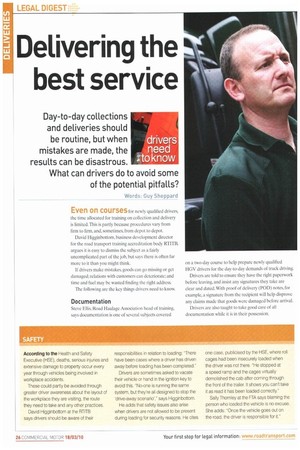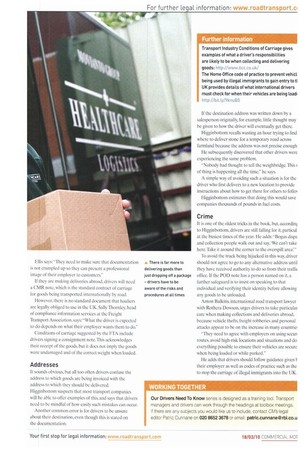Delivering the best service
Page 26

Page 27

If you've noticed an error in this article please click here to report it so we can fix it.
Day-to-day collections and deliveries should be routine, but when mistakes are made, the results can be disastrous. What can drivers do to avoid some of the potential pitfalls?
drivers need ;to know
Words: Guy Sheppard Even on courses for newly qualified drivers, the time allocated for training on collection and delivery is limited. This is partly because procedures vary from firm to firm, and, sometimes, from depot to depot.
David Higginbottom, business development director for the road transport training accreditation body RTITB. argues it is easy to dismiss the subject as a fairly uncomplicated part of the job, but says there is often far more to it than you might think.
If drivers make mistakes, goods can go missing or get damaged: relations with customers can deteriorate; and time and fuel may be wasted finding the right address.
The following are the key things drivers need to know.
Documentation
Steve Ellis, Road Haulage Association head of training, says documentation is one of several subjects covered on a two-day course to help prepare newly qualified HGV drivers for the day-to-day demands of truck driving.
Drivers are told to ensure they have the right paperwork before leaving, and insist any signatures they take are clear and dated. With proof of delivery (POD) notes, for example. a signature from the recipient will help disprove any claims made that goods were damaged before arrival.
Drivers are also taught to take good care of all documentation while it is in their possession. Ellis says: -They need to make sure that documentation is not crumpled up so they can present a professional image of their employer to customers."
If they are making deliveries abroad, drivers will need a CMR note, which is the standard contract of carriage for goods being transported internationally by road.
However, there is no standard document that hauliers are legally obliged to use in the UK. Sally. Thornley, head of compliance information services at the Freight Transport Association.says: "What the driver is expected to do depends on what their employer wants them to do."
Conditions of carriage suggested by the VIA include drivers signing a consignment note.This acknowledges their receipt of the goods. but it does not imply the goods were undamaged and of the correct weight when loaded.
Addresses
It sounds obvious, but all too often drivers confuse the address to which goods are being invoiced with the address to which they should be delivered.
Higginbottom suspects that most transport companies will be able to offer examples of this, and says that drivers need to be mindful of how easily such mistakes can occur.
Another common error is for drivers to be unsure about their destination, even though this is stated on the documentation. If the destination address was written down by a salesperson originally, for example, little thought may be given to how the driver will eventually get there.
Higginbottom recalls wasting an hour trying to find where to deliver stone for a temporary road across farmland because the address was not precise enough He subsequently discovered that other drivers were experiencing the same problem.
-Nobody had thought to tell the weighbridge. This of thing is happening all the time," he says.
A simple way of avoiding such a situation is for the driver who first delivers to a new location to provide instructions about how to get there for others to follol Higginbottom estimates that doing this would save companies thousands of pounds in fuel costs.
Crime
It is one of the oldest tricks in the book. but, accordinl to Higginbottom, drivers are still falling for it, particut at the busiest times of the year. He adds: "Bogus dispa and collection people walk out and say, We can't take here. Take it around the corner to the overspill areal" To avoid the truck being hijacked in this way, driver There is far more to should not agree to go to any alternative address until delivering goods than they have received authority to do so from their traffic just dropping off a package office. If the POD note has a person named on it, a drivers have to be further safeguard is to insist on speaking to that aware of the risks and individual and verifying their identity before allowing procedures at ail times any goods to he unloaded.
Anton Balkitis, international road transport lawyer with Rothera Dowson, urges drivers to take particulat care when making collections and deliveries abroad, because vehicle thefts, freight robberies and personal attacks appear to be on the increase in many countrie!
"They need to agree with employers on using secun routes, avoid high-risk locations and situations and do everything possible to ensure their vehicles are secure when being loaded or while parked."
He adds that drivers should follow guidance given their employer as well as codes of practice such as the to stop the carriage of illegal immigrants into the UK.




























































































































